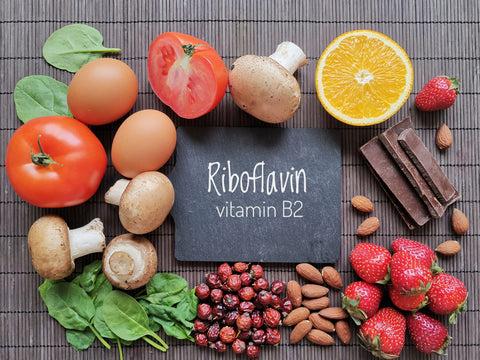Vitamin B2 (Riboflavin) is a water-soluble vitamin which plays a vital role in the human body and acts as an antioxidant reducing oxidative damage.
The word “Riboflavin” comes from the combination of two words, “Ribose” and “Flavin”. Ribose is a form of sugar (and a popular energy stimulating supplement known as D-ribose) that forms part of the structure of Riboflavin. “Flavin” is a type of pigment that gives Riboflavin a characteristic bright yellow colour when it gets oxidized.

Since it is a water-soluble vitamin, it can’t be stored in the body and therefore it must be obtained from the food we consume every day. For this reason, a refined diet high in sugar, white flour products, white rice, and the use of stimulants such as alcohol or coffee will lead to the deficiency of Riboflavin.
Like other B vitamins, also Riboflavin is used to support metabolism helping digest and extract energy from the foods by converting carbohydrates, fats and proteins into energy in the form of “ATP.” That’s why Riboflavin deficiency contributes to various health problems, including anaemia, fatigue, poor cognition, and a sluggish metabolism.
Deficiency
The most common B2 deficiency symptoms may include cracks in the lips and corners of the mouth, swollen tongue, scaly skin, sore throat, tiredness, weakness, redness of the lining of the mouth, etc.
Riboflavin deficiency contributes to Iron deficiency and anaemia as B2 has been shown in studies to affect the absorption and metabolism of Iron. Cross-sectional population studies show a relationship between Riboflavin intake and anaemia (1).
Deficiency of Vitamin B2 and B6 may create lesions on the mucous areas of skin due to defective collagen maturation (2,3).
B2 deficiency is related to increased levels of lactate (indicative of metabolic problem) (4).
In elderly type 2 diabetics, cognitive decline is linked with B2 deficiency (5).
DIETARY SOURCES
- Although B2 is found in some animal foods such as dairy, the healthiest sources of this vitamin are the unrefined (whole) plant foods such as legumes, nuts, seeds and certain vegetables and grains:
- Spinach, 1 cup: 0.5 mg
- Almonds, 1 ounce: 0.3 mg
- Quinoa, cooked, 1 cup: 0.2 mg
- Lentils, cooked, 1 cup: 0.1 mg
- Mushrooms, 1/2 cup: 0.1 mg
- Tahini, 2 tablespoons: 0.1 mg
- Kidney, Beans cooked 1 cup: 0.1 mg
Health Benefits
Migraines
Apart from 5-HTP (Tryptophan) also Vitamin B2 supplementation has shown to be beneficial in coping with migraine headaches. “Riboflavin is a safe and well-tolerated approach in treating migraine headaches” (6). It also reduced the frequency of migraines (7,8).
In mentioned below studies usually about 300-400mg of a daily dose of riboflavin was used:
“A 2016 review on the clinical evidence behind Riboflavin for Migraine concluded that daily doses of B2 may improve mitochondrial function, thereby preventing attacks and reducing the need for treatment.”
“A 2004 study found that patients who took Riboflavin experienced significantly fewer headaches and used fewer migraine pain killers or could completely avoid medications.”
“A 2016 review on the clinical evidence behind Riboflavin for Migraine concluded that daily doses of B2 may improve mitochondrial function, thereby preventing attacks and reducing the need for treatment.”
“A 2015 trial of 55 migraine patients on vitamin B2 showed decreased migraine ‘attack frequency’ and ‘headache days.”
“1998 study of 80 patients with migraine found that those in the Riboflavin group experienced 50% fewer migraines and reduced severity of pain than those in the placebo group (15% reduction).”
“Since in case of migraine headaches Vitamin B2 may be able to achieve similar results to prescription alternatives with much fewer problems, riboflavin can be considered as safe and more natural alternative to meds.”
In addition, Vitamin B2 is also needed to make serotonin, which deficiency is regarded as the key trigger of migraine headaches.
Leg Cramps
Riboflavin together with other B vitamins reduced the length, pain intensity, and frequency of night leg cramps in the elderly (9).
Hair and Skin
Because Riboflavin plays important role in regulating collagen levels in the body, it helps keep hair and skin healthy. Collagen is the most abundant protein found in skin, hair, nails, muscles, bones, and joints. Studies show that collagen helps improve skin elasticity and moisture (10) and can be effective in promoting hair growth (11).
Cardiovascular Health
Riboflavin supplementation reduced homocysteine, helping prevent heart disease (12).
Anti-inflammatory
Riboflavin shows anti-inflammatory properties under various circumstances (13) and significantly reduced inflammation in a systemic inflammatory syndrome in mice (14).
Brain Function
Increased dietary intake of Riboflavin was linked to better cognitive and abstract performance (15).
Riboflavin improved cognitive test scores in primary school children (16).
Mood
Riboflavin deficiency is a common problem among people with depression (17).
Riboflavin supplementation helped prevent depression after childbirth (18).
Vitamins B1, B2, and B6 improved mood in elderly, depressed subjects (19).
Eye Health
Increased dietary intake of Vitamin B2 lead to a significant decrease in age-related cataracts (20).
Immune System
Riboflavin reduced the risk of colon cancer in women (21,22).
There is a link between Riboflavin deficiency and increased risk of breast cancer (23), prostate cancer (24), and lung cancer (25).
Bone Health
B2 and other B vitamins play protective role in bone health (26,27,28).
Liver Health
Vitamin B2 reduced liver injury following liver ischaemia and reperfusion in mice (29) and may help reduce liver damage by promoting liver detoxification (30).
Autoimmune Diseases
Riboflavin helped suppress a motor disability model in multiple sclerosis in mice (31).
In a case study, treatment with Riboflavin was effective in treating Brown–Vialetto–Van Laere syndrome 2, a progressive neurological disorder (32).
Pregnancy
Riboflavin supplementation led to more pregnancy, increased weight of the pups, and increased haemoglobin in mice (33).
Anaemia
In the type of anaemia, which is caused by Iron deficiency, taking a good multivitamin (high in B complex including B2) or taking a B complex supplement with 20-50mg of Riboflavin after first meal is often recommended to reduce the time of recovery from anaemia as B2 has been shown in studies to affect the absorption and metabolism of Iron.
Recommended Daily Intake
- Infants 0-6 months: 0.3mg
- 7-12 months: 0.4mg
- Children 1-3 years: 0.5mg
- 4-8 years: 0.6mg
- 9-13 years: 1.0mg
- Men over 14 years: 1.4mg
- Women 14-18 years: 1.0mg
- Women over 18 years: 1.1mg
- Pregnant: 1.4mg
- Breastfeeding: 1.6mg
Safe Upper Limit
Because Vitamin B2 is a water-soluble vitamin, there is a very small risk of toxicity because excess is excreted from the body with the urine.
The official safe upper limit for Vitamin B2 (Riboflavin) from supplements in EU countries is 40mg per day taken over a longer period.
However, in studies usually about 300-400mg of a daily dose of riboflavin was used. According to one study, administering 400 milligrams of B2 per day (over 200 times the recommended daily intake) to participants resulted in no negative side effects (7).
Interactions
Calcium may form a chelate with Riboflavin (B2), decreasing its absorption.
Vitamin B1 helps increase absorption of B2.
Very high levels of Vitamin B1 may interfere with absorption of B2.
B2 helps with Vitamin B6 metabolism.
Molybdenum interacts with Vitamin B2 to infuse iron and haemoglobin, thus contributing to the development of healthy red blood cells.
Riboflavin has been shown in studies to affect the absorption and metabolism of Iron. Cross-sectional population studies show a relationship between riboflavin intake and anaemia.
B3, B6, Folate, B12, Iron & Zinc can’t be fully bioavailable without B2.
Talk to your healthcare provider before taking Riboflavin as potential interactions with some medications are possible.
Urine
Riboflavin taken alone or in multivitamins can cause the urine to turn yellow orange in colour.
When taken in high amounts it may cause diarrhoea and increased urine production.
Contradictions
In some sensitive individuals Vitamin B2 may trigger allergic reactions.
Related Articles
References
- Riboflavin (vitamin B-2) and health - PubMed (nih.gov)
- Riboflavin metabolism--relevance to human nutrition - PubMed (nih.gov)
- Riboflavin deficiency: mucocutaneous signs of acute and chronic deficiency - PubMed (nih.gov)
- Emerging role of riboflavin in the treatment of nucleoside analogue-induced type B lactic acidosis - PubMed (nih.gov)
- Low intakes of carotene, vitamin B2 , pantothenate and calcium predict cognitive decline among elderly patients with diabetes mellitus: The Japanese Elderly Diabetes Intervention Trial - PubMed (nih.gov)
- Supplementation with Riboflavin (Vitamin B2) for Migraine Prophylaxis in Adults and Children: A Review - PubMed (nih.gov)
- High-dose riboflavin treatment is efficacious in migraine prophylaxis: an open study in a tertiary care centre - PubMed (nih.gov)
- Improvement of migraine symptoms with a proprietary supplement containing riboflavin, magnesium and Q10: a randomized, placebo-controlled, double-blind, multicenter trial - PubMed (nih.gov)
- Randomized, double-blind, placebo-controlled study of the safety and efficacy of vitamin B complex in the treatment of nocturnal leg cramps in elderly patients with hypertension - PubMed (nih.gov)
- Oral supplementation of specific collagen peptides has beneficial effects on human skin physiology: a double-blind, placebo-controlled study - PubMed (nih.gov)
- Lack of Collagen VI Promotes Wound-Induced Hair Growth - PubMed (nih.gov)
- Riboflavin supplementation and biomarkers of cardiovascular disease in the elderly - PubMed (nih.gov)
- Characterization of the antinociceptive and anti-inflammatory activities of riboflavin in different experimental models - PubMed (nih.gov)
- HMGB1 Inhibition During Zymosan-Induced Inflammation: The Potential Therapeutic Action of Riboflavin - PubMed (nih.gov)
- Nutritional status and cognitive functioning in a normally aging sample: a 6-y reassessment - PubMed (nih.gov)
- Dietary micronutrients are associated with higher cognitive function gains among primary school children in rural Kenya - PubMed (nih.gov)
- Riboflavin status and its association with serum hs-CRP levels among clinical nurses with depression - PubMed (nih.gov)
- Dietary folate and vitamins B12, B6, and B2 intake and the risk of postpartum depression in Japan: the Osaka Maternal and Child Health Study - PubMed (nih.gov)
- Brief communication. Vitamin B1, B2, and B6 augmentation of tricyclic antidepressant treatment in geriatric depression with cognitive dysfunction - PubMed (nih.gov)
- Diet and nuclear lens opacities - PubMed (nih.gov)
- Dietary folate, methionine, riboflavin, and vitamin B-6 and risk of sporadic colorectal cancer - PubMed (nih.gov)
- Riboflavin deficiency and esophageal cancer: a case control-household study in the Caspian Littoral of Iran - PubMed (nih.gov)
- Dietary intake of B vitamins and methionine and breast cancer risk - PubMed (nih.gov)
- Dietary intake of B vitamins and methionine and prostate cancer incidence and mortality - PubMed (nih.gov)
- Dietary intake of B vitamins and methionine and risk of lung cancer - PubMed (nih.gov)
- B-Vitamins and Bone Health–A Review of the Current Evidence - PMC (nih.gov)
- Low dietary riboflavin but not folate predicts increased fracture risk in postmenopausal women homozygous for the MTHFR 677 T allele - PubMed (nih.gov)
- Effect of dietary B vitamins on BMD and risk of fracture in elderly men and women: the Rotterdam study - PubMed (nih.gov)
- Riboflavin (vitamin B-2) reduces hepatocellular injury following liver ischaemia and reperfusion in mice - PubMed (nih.gov)
- Carbon tetrachloride-induced hepatotoxicity in rat is reversed by treatment with riboflavin - PubMed (nih.gov)
- Brain-derived neurotrophic and immunologic factors: beneficial effects of riboflavin on motor disability in murine model of multiple sclerosis - PubMed (nih.gov)
- Exome sequencing results in successful riboflavin treatment of a rapidly progressive neurological condition - PMC (nih.gov)
- Effect of riboflavin supplementation on zinc and iron absorption and growth performance in mice - PubMed (nih.gov)
Sources
- https://selfhacked.com/blog/riboflavin/
- https://draxe.com/riboflavin-foods/
- Rahimdel A, Zeinali A, Yazdian-Anari P, Hajizadeh R, Arefnia E. Effectiveness of Vitamin B2 versus Sodium Valproate in Migraine Prophylaxis: 2015 Oct 19;7(6):1344-8. doi: 10.14661/1344.
Any information or product suggested on this website is not intended to diagnose, treat, cure or prevent any medical condition. Never disregard medical advice or delay in seeking it because of something you have read on this website. Consult your primary healthcare physician before using any supplements or making any changes to your regime.




